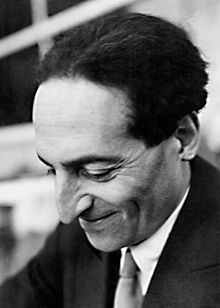Heinrich Jacoby
Heinrich Jacoby (born April 3, 1889 in Frankfurt am Main , † November 25, 1964 in Zurich ) was a German - Swiss musician and talent researcher .
biography
Although Heinrich Jacoby would have liked to study music as a teenager, he initially completed an apprenticeship in a hardware store at the request of his parents. In 1907, after completing his apprenticeship, he began studying music with Hans Pfitzner at the Strasbourg Conservatory and graduated in 1913. During his studies he worked at the Strasbourg City Theater - alongside Wilhelm Furtwängler and Otto Klemperer as a conductor and volunteer director. In 1913 he was able to take over the management of teacher training for music at the educational institute for music and rhythm in Dresden-Hellerau founded by Émile Jaques-Dalcroze ; during the First World War he served temporarily in the army. From 1919 to 1922 he directed music education at the Odenwald School . In 1924, while working as a private scholar in Berlin, he met Elsa Gindler . This encounter marked the beginning of an intensive collaboration, which was not interrupted by Jacoby's forced emigration to Switzerland in 1933. His residence status was uncertain until 1947, he continued to deal with his examinations and studies, but under very difficult conditions: Officially, he was not allowed to work or publish, and only thanks to the support of various personalities (including Heinrich Hanselmann Professor at the curative education seminar in Zurich, and the industrial family Matter in Kölliken) it was possible for him to give lectures and courses from time to time. In 1947 the conditions were lifted and in 1955 he became a Swiss citizen . Until his death in 1964 he gave courses on his experiences and knowledge that resulted from the question,
“ How can we maintain the natural, functional behavior and creative possibilities for the child despite the difficult conditions in our society and regain them as adults? "
Pedagogical approach
Jacoby recognized from his own observations in young people and adults that there is no (musical) talent in the true sense, but only a more or less successful development of one's own development possibilities according to the influence of educators, teachers and the environment. Regulations, unsuitable questions, hasty assistance and problem solving disturb one's own development, people lose the ability and courage to try things out, to improvise and to spontaneously allow their own expressions, be it in the field of music, movement or language ) Expression.
In his courses, Jacoby tried to encourage the participants to become aware of undesirable developments caused by external influences, to rethink their own behavior and to mobilize and rediscover their possibilities and skills. The aim was not the self-fulfillment of the adults, but the education of the educators. Jacoby was convinced that the educators, thanks to their own post-development, would have less of a handicap effect on their protégés and the latter could thus develop more creatively and undisturbed.
“The mentality and behavior of the teaching adults, the attitude to the possibilities of the young person would have to change. "
" A person should not be admitted to the educational profession, to the nursing profession, but also to the medical profession, until he has an idea of the impact of his condition and behavior on others "
Works
- Beyond 'gifted' and 'untalented': Purposeful questioning and purposeful behavior - the key to human development . Introductory course 1945. Edited by Sophie Ludwig. Christians Hamburg. 2004/6. Edition.
- Music. Talks - attempts 1953-1954. Documents of a music course . Edited by Sophie Ludwig. Extended new edition with audio examples from the course, compiled by Rudolf Weber, edited on behalf of the Heinrich Jacoby Elsa Gindler Foundation. Seven audio samples on one CD. Christians, Hamburg 2003.
- Beyond 'musical' and 'unmusical'. The liberation of the creative forces, illustrated by the example of music. Essays and lectures from the years 1924-1927 . Edited by Sophie Ludwig. Christians, Hamburg 1995/2. Edition. ISBN 978-3-7672-0871-1 .
- Educate - teach - develop. Documentation from courses in Zurich 1954/55 . Edit and ed. by Sophie Ludwig in connection with the Heinrich Jacoby / Elsa Gindler Foundation. Christians, Hamburg 1989.
literature
- Inken Neubauer: On the practice of the Heinrich Jacobys working group - "Interest through the way we are ...". Dr. Kovac, Hamburg 2010.
- Rudolf Weber: The Development of Man - Work and Endeavor Heinrich Jacoby against the background of his biography. Series of publications by the Heinrich Jacoby-Elsa Gindler Foundation, Berlin 2010.
- Walter Biedermann: Unmusical? Heinrich Jacoby's music pedagogy . Nepomuk, Aarau 1993.
- Walter Biedermann: Development instead of education - Heinrich Jacoby's pedagogy . Arbor, Freiamt in the Black Forest, 2003.
- Heike Le Brün-Hölscher: Music education with Heinrich Jacoby . (Dissertation). Lit-Verlag, Münster 1987.
- Andrea Klaffke: Heinrich Jacoby's ideas and their significance for today's music lessons . Concrete Music Education Volume 1.
- Norbert Klinkenberg: Moshé Feldenkrais and Heinrich Jacoby - An encounter . Series of publications by the Heinrich Jacoby-Elsa Gindler Foundation, Volume 1. Berlin 2002.
- Hannes Zahner: Self-empowerment - Heinrich Jacoby's psychophysical approach . Sentio, Boncourt 2015.
See also
Web links
- working group jacoby / gindler, Switzerland
- Heinrich Jacoby / Elsa Gindler Foundation, Germany
- CoForum: Heinrich Jacoby
- sensory awareness, USA
- Paths of Development eV, Germany
- Literature by and about Heinrich Jacoby in the catalog of the German National Library
| personal data | |
|---|---|
| SURNAME | Jacoby, Heinrich |
| BRIEF DESCRIPTION | German-Swiss musician and talent researcher |
| DATE OF BIRTH | April 3, 1889 |
| PLACE OF BIRTH | Frankfurt am Main |
| DATE OF DEATH | November 25, 1964 |
| Place of death | Zurich |
